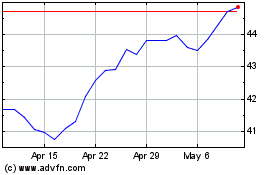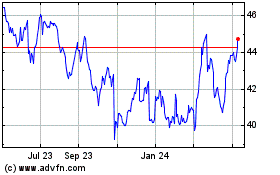By Jennifer Maloney and Alex Leary
President Trump said the U.S. plans to pull most vaping products
from the market, citing growing concerns about health hazards and
rising use by teenagers of the trendy alternative to traditional
cigarettes.
The Food and Drug Administration intends to ban popular fruity
flavors, as well as menthol and mint e-cigarettes from stores and
online sellers, leaving just tobacco-flavored products. The move
poses a major threat to a fast-growing market that reached $7
billion in sales last year and is dominated by startup Juul Labs
Inc., which counts on mango, mint and other fruity flavors for most
of its sales.
Public-health officials have encouraged adult smokers to switch
to less risky products such as e-cigarettes, which deliver nicotine
in a cloud of vapor. Tobacco companies have invested in the
technology to offset declining sales as smokers switched to new
entrants like Juul. But the sleek devices also proved popular with
teens and young people who had never smoked.
About 8 million adults use e-cigarettes, but 5 million children
are also vaping, including more than a quarter of high-school
students, according to the latest government estimates.
"We have a problem in our country. It's a new problem," Mr.
Trump told reporters in the Oval Office on Wednesday as he met with
top health officials. "It's called vaping, especially vaping as it
pertains to innocent children."
The move comes as officials are investigating more than 450
potential cases of pulmonary illness related to vaping products,
many of them containing marijuana. Six deaths in the U.S. have been
associated with the illness. The latest death, reported Tuesday,
was a Kansas resident over the age of 50, the state's health
department said.
First lady Melania Trump, who was in the room with the president
and the health officials, has urged more regulation of vaping
products, and Mr. Trump cited her concerns about the welfare of
their child, Baron.
Public-health officials say sweet and fruity flavors are
appealing to young people and have contributed to a surge in teen
vaping. Mint, mango and other fruity flavors account for more than
80% of sales for Juul, the U.S. market leader, according to people
familiar with the matter. Other vaping companies advertise flavors
such as Bubblegum, Watermelon Twist and BlueRazz.
While the specific cause of recent lung illnesses is still
unclear, doctors say some sort of chemical exposure related to
vaping or e-cigarette use may be causing inflammation or injury in
the lungs. Preliminary evidence indicates that the majority of the
cases relate not to standard e-cigarettes, but to those using
ingredients like THC, or tetrahydrocannabinol, the psychoactive
ingredient in marijuana. Health authorities have warned people not
to tamper with the devices or buy products off the street.
Outside the White House, Alex Azar, the secretary for Health and
Human Services, said the administration's planned ban on mint and
menthol flavored e-cigarettes was prompted by 2019 government
survey data showing an alarming jump in teen use of e-cigarettes,
including those flavors.
The preliminary data show that more than 25% of high-school
students were e-cigarette users in 2019, up from 21% a year
earlier, and the overwhelming majority of youth vapers said they
used fruit and menthol or mint flavors, the HHS said.
"An entire generation of children risk becoming addicted to
nicotine," Mr. Azar said. He said it would take the FDA several
weeks to put out the final guidance on the new policy. Then, after
a 30-day period, all e-cigarettes, except for tobacco-flavored
products, would have to be removed from the market.
Manufacturers of tobacco-flavored e-cigarettes may continue to
sell their products but must apply by May 2020 for an FDA review.
Makers of all other e-cigarette flavors can also apply for FDA
authorization, but their products would be off the market pending
the review.
"The tremendous progress we've made in reducing youth tobacco
use in the U.S. is jeopardized by this onslaught of e-cigarette
use," said Acting FDA Commissioner Ned Sharpless.
"We strongly agree with the need for aggressive category-wide
action on flavored products," a Juul spokesman said. "We will fully
comply with the final FDA policy when effective."
"We agree that urgent action is needed and look forward to
reviewing the guidance," said a spokesman for Marlboro maker Altria
Group Inc., which owns 35% of Juul. "Reducing youth use of e-vapor
products is a top priority for Altria." Altria, which previously
sold flavored e-cigarettes, pulled its vaping products from the
market last year before investing $12.8 billion in Juul.
The regulatory shift comes at a tricky time for Altria; the
company is in negotiations to merge with Philip Morris
International Inc., which sells Marlboro outside the U.S. After
briefly dipping on the president's announcement, shares of Altria
gained 1% to $44.72 on Wednesday. Restrictions on e-cigarettes
could slow the shift to vaping and keep more people smoking
traditional cigarettes, analysts say.
A ban on mint and menthol presents a significant risk to Juul's
outlook, said Morgan Stanley analyst Pamela Kaufman. But the
crackdown could help cigarette sales if vapers switch back or if it
slows the switch to vaping, she added.
The No. 2 U.S. cigarette maker, British American Tobacco PLC,
whose Reynolds American division sells Vuse branded e-cigarettes,
said it doesn't sell flavors that mimic children's food or appeal
to youth.
Thomas M. Burton contributed to this article.
Write to Jennifer Maloney at jennifer.maloney@wsj.com and Alex
Leary at alex.leary@wsj.com
(END) Dow Jones Newswires
September 11, 2019 19:13 ET (23:13 GMT)
Copyright (c) 2019 Dow Jones & Company, Inc.
Altria (NYSE:MO)
Historical Stock Chart
From Mar 2024 to Apr 2024

Altria (NYSE:MO)
Historical Stock Chart
From Apr 2023 to Apr 2024
